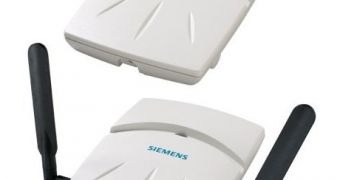Siemens, one of the last enterprise wireless network vendor to have joined the 802.11n standard, has just announced that it has released its own version of wireless gear to comply with the standard. The 802.11n specifications set has not been fully ratified yet, but it was proven to deliver up to five times the throughput of the previous 802.11g specifications, along with increased security and stability.
The IEEE consortium has already delayed several times the final ratification, and the new standard won't become official until early 2009. At this time, some major network gear vendors, such as Cisco and Aruba Networks have already introduced and distributed their own 802.11n gear, yet Siemens VP of enterprise mobility, Luc Roy, states that these products feature some serious issues associated with the higher power access points and controllers.
"There are issues out there with the previous .11n systems getting fully deployed, and we've actually solved those," Roy claimed. These issues are related with power-over-Ethernet. The 802.11n systems require more power than a generic Ethernet switch, built with the 802.3af standard. Aruba Networks claims that its gear works just fine, although in a reduced performance mode, while Cisco uses a "discovery protocol" that allows its access points to deliver extra power when working under the 802.11n standard.
However, Siemens claims to have solved the electrical challenge. A press release claims that the "HiPath Wireless system is the first solution to provide full dual-band 3x3 MIMO and 802.11n functionality that complies with the 802.3af power-over Ethernet (PoE) standard". Their proprietary technology allows traffic to be routed either locally, on the access points, or centrally, via the controller.
"More than 80% of our customers are using power-over-Ethernet to power their APs," Roy said, "and 802.11n is very power-hungry. So we knew we'd better make sure it's compatible."
The company's revolutionary gear is undergoing tests and will hit the market early in march. The HiPath Wireless Access Points are primarily targeted at corporate and business use, and will arrive with a $1,300 price tag.

 14 DAY TRIAL //
14 DAY TRIAL //